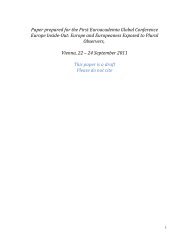Emanuel Crudu The EU and Collective Identities ... - Euroacademia
Emanuel Crudu The EU and Collective Identities ... - Euroacademia
Emanuel Crudu The EU and Collective Identities ... - Euroacademia
You also want an ePaper? Increase the reach of your titles
YUMPU automatically turns print PDFs into web optimized ePapers that Google loves.
narrative use of maps <strong>and</strong> a formation in Europe of quasi-geographical concentric circles aiming to keep the core<br />
intact. Among these circles, “the first is about the core itself, the second pertains to close outsiders, <strong>and</strong> the third refers<br />
to those peripheral actors that circle around this centre” (Wæver 1997: 68). Klaus Eder (2005) also suggested that in<br />
order to answer who are the Europeans in the context of integration one must distinguish between core <strong>and</strong> peripheral<br />
Europeans. That is to identify a core that has the power to define who is European beyond doubt <strong>and</strong> to treat the<br />
other’s ways of defining Europeaness as counterclaims. <strong>The</strong> core Europeans are, in Eder’s argument, the ones<br />
searching to retain the symbolic power of naming, that is naming the other. Looking at identities as product of social<br />
struggles, he sees the occurrence of a core European identity as a fact:<br />
This core/periphery distinction sets off a dynamic of identity construction, which is shaped by core Europeans, not yet<br />
Europeans <strong>and</strong> potential Europeans who distinguish themselves from the non-Europeans <strong>and</strong>/or the anti-Europeans. It is<br />
within such struggles that the issue of the construction of a European identity must be located’ (Eder 2005: 200).<br />
We might ask on what privileged meta-analytical position is one to be placed to see this multilayered struggle for<br />
comprehension. Still, not even the core Europe has much agreement on “the power of naming”. Maria Rovisco (2010)<br />
has followed quality media to show how the narratives differ significantly between France <strong>and</strong> Britain in the struggle<br />
to define what the European core is all about. It could be expected that such a variation will be visible in other “core”<br />
countries as well. This shows that Europe is trapped in an ongoing process of naming with a complicated <strong>and</strong> multicentric<br />
imagination when it’s about the shape of its others. <strong>The</strong> persistent core – periphery nexus is the sign that the<br />
<strong>EU</strong> is not able to live up to its cosmopolitan ideals.<br />
References:<br />
AlSayyad, Nezar <strong>and</strong> Manuel Castells (eds.). 2002. Muslim Europe or Euro-Islam: Politics, Culture, <strong>and</strong> Citizenship in the Age of<br />
Globalisation. Oxford: Lexington Books, 2002.<br />
Antonsich, Marco. 2008. <strong>The</strong> Narration of Europe in ‘National’ <strong>and</strong> ‘Post-National’ Terms: Gauging the Gap between Normative<br />
Discourses <strong>and</strong> People’s View. European Journal of Social <strong>The</strong>ory. 11(4), s.505-522.<br />
Ash, Timothy Garton. 2004. Trials, Purges <strong>and</strong> History Lessons: Treating a Difficult Past in Post-Communist . In Jan-Werner<br />
Muller (ed.). Memory <strong>and</strong> Power in Post-War Europe. Cambridge: Cambridge University Press, pp. 265 – 282.<br />
Bartlett, Robert. 1993. <strong>The</strong> Making of Europe. Conquest, Colonization <strong>and</strong> Cultural Change. 950-1350. Princeton: Princeton<br />
University Press.<br />
Blokker, Paul. 2008. Europe ‘United in Diversity’: Frome a Central European Identity to Post-Nationality European Journal of<br />
Social <strong>The</strong>ory, 11(2), s. 257-274.<br />
Bottici, Chiara. 2008. Europe, War <strong>and</strong> Remembrance. In Furio Cerutti <strong>and</strong> Sonia Lucarelli (eds), <strong>The</strong> Search for a European<br />
Identity. Values, Policies <strong>and</strong> Legitimacy of the European Union. London <strong>and</strong> New York: Routledge, pp. 45-58.<br />
Browning, Christopher S. 2007. Br<strong>and</strong>ing Nordicity. Models, Identity <strong>and</strong> the Decline of Exceptionalism. Cooperation <strong>and</strong><br />
Conflict: Journal of the Nordic International Studies Association. 42(1), s. 27–51.<br />
Buzan, Barry <strong>and</strong> Ole Wæver. 2003. Regions <strong>and</strong> Powers. <strong>The</strong> Structure of International Security. Cambridge: Cambridge<br />
University Press.<br />
Cantor, Norman. 1969. Medieval History: Life <strong>and</strong> Death of a Civilization. New York: Macmillan Publishing.<br />
Case, Holly. 2009. Being European: East <strong>and</strong> West. In Checkel, Jeffrey T. <strong>and</strong> Peter J. Katzenstein (eds.), European Identity.<br />
Cambridge: Cambridge University Press, pp. 111-131.<br />
Castoriadis, Cornelius. 1991. Philosophy, Politics, Autonomy. Edited by David Ames Curtis. Oxford: Oxford University Press.<br />
Castoriadis, Cornelius. 1998. <strong>The</strong> Imaginary Institution of Society. Translated by Kathleen Blamey. Cambridge: MIT Press.<br />
Chall<strong>and</strong>, Benoît. 2009. 1989. Contested Memories <strong>and</strong> the Shifting Cognitive Maps of Europe, European Journal of Social<br />
<strong>The</strong>ory. 12 (3), s. 397-408.<br />
Checkel, Jeffrey T. <strong>and</strong> Peter J. Katzenstein (eds.). 2009. European Identity. Cambridge: Cambridge University Press.<br />
Checkel, Jeffrey T. <strong>and</strong> Peter J. Katzenstein. 2009. <strong>The</strong> Politicization of European <strong>Identities</strong>. In Checkel, Jeffrey T. <strong>and</strong> Peter J.<br />
Katzenstein (eds.), European Identity. Cambridge: Cambridge University Press, pp. 1-25.<br />
Delanty, Gerard (ed.). 2006. Europe <strong>and</strong> Asia Beyond East <strong>and</strong> West. London <strong>and</strong> New York: Routledge.<br />
Delanty, Gerard. 1995. Inventing Europe. Idea, Identity, Reality. Basingstoke: Macmillan.<br />
Delanty, Gerard. 1995a. <strong>The</strong> Limits <strong>and</strong> Possibilities of a European Identity. A Critique of Cultural Essentialisms. Philosophy <strong>and</strong><br />
Social Criticism. 21(4), s. 15-36.<br />
Delanty, Gerard. 2003. <strong>The</strong> Making of Post-Western Europe: A Civilizational Analysis. <strong>The</strong>sis Eleven. 72(8), s. 8-25.<br />
Delanty, Gerard. 2003a. Conceptions of Europe: A Review of Recent Trends. European Journal of Social <strong>The</strong>ory. 6(4), s. 471-488.<br />
Dench, Emma. 1995. From Barbarians to New Men. Greek, Roman <strong>and</strong> Modern Perceptions of Peoples from the Central<br />
Appenines. Oxford.: Oxford University Press.<br />
Eder, Klaus. 2004. <strong>The</strong> Two Faces of Europeanization: Synchronizing a Europe Moving at Varying Speeds. Time <strong>and</strong> Society,<br />
13(1), s. 89-107.<br />
Eder, Klaus. 2005. Remembering National Memories Together: <strong>The</strong> Formation of a Transnational Identity in Europe. In Eder,<br />
Klaus <strong>and</strong> Willfried Spohn (eds.). <strong>Collective</strong> Memory <strong>and</strong> European Identity. <strong>The</strong> Effects of Integration <strong>and</strong> Enlargement,<br />
Aldershot: Ashgate, pp. 197-220.<br />
Favell, Adrian. 2009. Immigration, Migration <strong>and</strong> Free Movement in the Making of Europe. In Jeffrey T. Checkel <strong>and</strong> Peter J.<br />
Katzenstein (eds.), European Identity. Cambridge: Cambridge University Press, pp. 167-189.<br />
Hansen, Peo. 2004. In the Name of Europe. Race & Class. 45(3), s. 49-62.<br />
9











